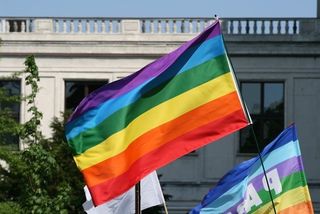Religion Unimportant to Most LGBT Americans

Americans who identify as lesbian, gay, bisexual or transgender (LGBT) are much less likely to be religious than non-LGBT Americans, according to a new Gallup poll.
Just less than half of LGBT Americans said religion is important in their daily lives, compared with about two-thirds of non-LGBT Americans. Moreover, about 40 percent of non-LGBT adults identified themselves as highly religious, compared with just 24 percent of LGBT adults. About the same percentage of LGBT and non-LGBT Americans said they considered themselves moderately religious (29 percent). But LGBT Americans were much more likely to identify as not religious at all: 47 percent considered themselves not religious, compared with just 30 percent of non-LGBT Americans.
Participants were categorized as "highly religious" if they said religion played an important role in their day-to-day life and they attended a religious service every week, according to Gallup. A person was considered "not religious" if they said religion is not important in their daily life and they seldom or never attended any religious service, according to Gallup. "Moderately religious" people reported that religion is important to them but they do not regularly attend services. [10 Milestones in Gay Rights History]
Part of the reason for the disparity in religiousness may be that LGBT individuals do not feel welcomed into religious communities whose doctrine does not support any kind of nonheterosexual relationship, Gallup representatives noted.
However, religious doctrine is not the only explanation for the difference in religiousness between the two groups: Gallup representatives pointed out that LGBT people may be more likely to live in areas where religion is less common, and more likely to adopt the same mind-set and practices of others in the area.
Age may also play a significant role, according to a statement from Gallup. Overall, the U.S. LGBT population is much younger than the non-LGBT population, and young adults are less religious than any other age group in the United States. This could partially explain the lower rates of religious people among the LGBT group, according to Gallup.
However, even after breaking up the data by age, LGBT individuals are still less likely to identify themselves as religious. More than half of LGBT young adults (ages 18 to 34) reported they are not religious, while only 39 percent of non-LGBT young adults said they are not religious.
Sign up for the Live Science daily newsletter now
Get the world’s most fascinating discoveries delivered straight to your inbox.
LGBT individuals were most likely to identify with Protestantism (35 percent), followed by Catholicism (20 percent). LGBT individuals were also much more likely to identify with a non-Christian religion (8 percent) than non-LGBT individuals (2 percent).
Earlier this summer, the U.S. Presbyterian Church voted to allow ministers to marry LGBT couples if their state has legalized same-sex marriage. If religious communities continue to become more accepting, the religious gap between LGBT and non-LGBT individuals may close, Gallup representatives said.
The results of the poll are based on 104,000 telephone interviews with U.S. adults ages 18 or older between Jan. 2 and July 31.
Follow Kelly Dickerson on Twitter. Follow us @livescience, Facebook & Google+. Original article on Live Science.
